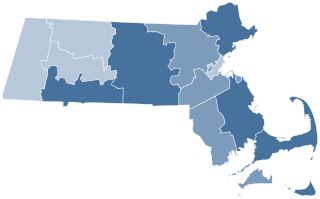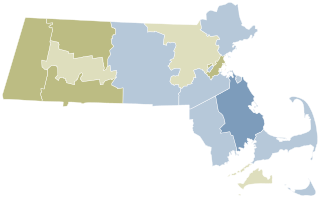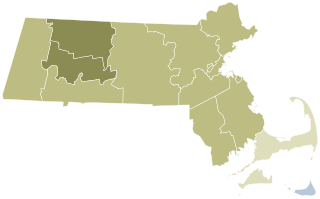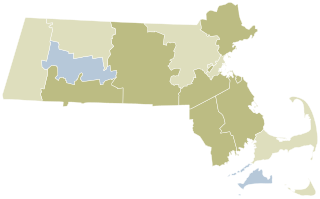Proposition 2½ is a Massachusetts statute that limits property tax assessments and, secondarily, automobile excise tax levies by Massachusetts municipalities. The name of the initiative refers to the 2.5% ceiling on total property taxes annually as well as the 2.5% limit on property tax increases. It was passed by ballot measure, specifically called an initiative petition within Massachusetts state law for any form of referendum voting, in 1980 and went into effect in 1982. The effort to enact the proposition was led by the anti-tax group Citizens for Limited Taxation. It is similar to other "tax revolt" measures passed around the same time in other parts of the United States. This particular proposition followed the movements of states such as California.

The State Income Tax Repeal, also known as Massachusetts Question 1, was one of the 2008 ballot measures that appeared on the November 4, 2008 ballot in the U.S. state of Massachusetts. Voters were asked whether or not they approved of the proposed measure which, if it had passed, would have ended the 5.3% income tax in Massachusetts on wages, interest, dividends and capital gains. Ultimately, Massachusetts voters defeated Question 1 by a wide margin, with approximately 70% opposed versus 30% in favor.
The Massachusetts general election, 2010 was held on November 2, 2010 throughout Massachusetts. Primary elections took place on September 14, 2010.

The Massachusetts English Language Education in Public Schools Initiative, Question 2 was a successful initiative voted on in the Massachusetts general election held on November 5, 2002. It was one of three 2002 ballot measures put to public vote, and the only one to pass.
A Massachusetts general election was held on November 5, 2002 in the Commonwealth of Massachusetts.

The No Sales Tax for Alcohol Question, also known as Question 1, was on the November 2, 2010 ballot in Massachusetts. The measure asked voters whether to repeal a sales tax on alcohol sales. The ballot measure for the 2010 ballot was added after the Massachusetts State Legislature increased the sales tax in the state from 5% to 6.25% and eliminated an exemption for alcohol sold in liquor stores.

Massachusetts Question 3, filed under the name, the 3 percent Sales Tax Relief Act, appears on the November 2, 2010 ballot in the state of Massachusetts as an initiative. The measure, if enacted by voters, would reduce the state sales tax rate from 6.25 to 3 percent. The measure was sponsored by the Alliance to Roll Back Taxes headed by Carla Howell. The measure would be enacted into a law 30 days after the election if approved by voters.

The Massachusetts Medical Marijuana Initiative, appeared as the third question on the state's 2012 ballot as an indirect initiated state statute. The measure allows cannabis to be used for medical purposes in the state. The initiative—backed by the American Civil Liberties Union, the Massachusetts Patient Advocacy Alliance, and the Committee for Compassionate Medicine—was filed with proponents turning in the required signatures to the Massachusetts Attorney General's office by the August 3, 2011 deadline. Those signatures were needed for the required ten qualified voters who submitted the original petition to put forward the full text of the law they want enacted. The initiative passed with support from 63% of state voters.
The Massachusetts general election, 2012 was held on November 6, 2012, throughout Massachusetts. Primary elections took place on September 6, 2012.
The Massachusetts Bottle Bill is a container-deposit legislation dealing with recycling in the United States that originally passed in the U.S. state of Massachusetts in 1982 as the Beverage Container Recovery Law. Implemented in 1983, the law requires containers of carbonated beverages to be returnable with a minimum return value of $0.05. The bottle bill does not cover containers of non-carbonated beverages like water, tea, or sports drinks. The law also establishes the handling fee paid by distributors to redemption centers, $0.0325 per unit as of July 5, 2013, and to retailers $0.0225 per unit. As the number of non-deposit beverage containers has increased to represent over one-third of beverage containers sold, the Bottle Bill has no influence on these non-deposit containers, with the result that these containers are three times more likely to be found as litter in Massachusetts communities. Additional studies indicate that beverage containers covered by the state's container deposit system are redeemed at approximately 70% and another 9% are recycled via curbside programs. Conversely, containers that are not covered, such as bottled water, juices, and sports drinks, are recycled at approximately 25%.

The Massachusetts Automatic Gas Tax Increase Repeal Initiative, Question 1 was on the November 4, 2014 statewide ballot. Approved by voters, the measure repeals a 2013 law that would automatically adjust gas taxes according to inflation, allowing for automatic annual increases in the state's gas tax.

The Massachusetts Charter School Expansion Initiative, Question 2 was an unsuccessful initiative voted on in the Massachusetts general election held on November 8, 2016. It was one of four 2016 ballot measures put to public vote.

The Massachusetts Expand Slot Machine Gaming Initiative was a 2016 Massachusetts ballot measure. Also known as Question 1, it was an indirect initiated state statute question that would allow the Massachusetts Gaming Commission to issue an additional license for another slot machine parlor to exist in the state. The referendum question said that the extra slots parlor could only be permitted on a site that was at least 4 acres in size and located within 1,500 feet of a racecourse. The only location in the state where this would have applied was Suffolk Downs in East Boston.

The 2018 Massachusetts general election was held on November 6, 2018, throughout Massachusetts. Primary elections took place on September 4. Early voting took place from October 22 through November 2.

The Massachusetts Casino Repeal Initiative was an unsuccessful initiative voted on in the Massachusetts general election held on November 4, 2014. It was one of four 2014 ballot measures put to public vote.

The Massachusetts Paid Sick Days Initiative was a successful initiative voted on in the Massachusetts general election held on November 4, 2014. It was one of four 2014 ballot measures put to public vote.
Three ballot measures were certified for the November 6, 2018, general election in the state of Massachusetts.
The 2020 Massachusetts general election was held on November 3, 2020, throughout Massachusetts. Primary elections were held on September 1, 2020.

Massachusetts Ranked-Choice Voting Initiative, also known as Question 2, was an initiative at the 2020 Massachusetts general election that would have changed primaries and elections in Massachusetts from plurality voting to ranked-choice voting (RCV) for all Massachusetts statewide offices, state legislative offices, federal congressional offices, and certain other offices beginning in 2022. RCV would not be extended to elections for president, county commissioner, or regional district school committee member. The initiative failed, with 54.8% of voters voting 'No' and 45.2% 'Yes'.

The Massachusetts Right to Repair Initiative (2020), also known as Question 1, appeared on the Massachusetts 2020 general election ballot as an initiated state statute. It was approved by voters and the measure will update the state's right to repair laws to include electronic vehicle data. A similar Right to repair initiative appeared on the 2012 state ballot and passed with 86% of the vote.
















